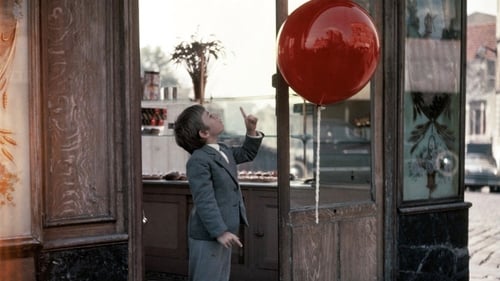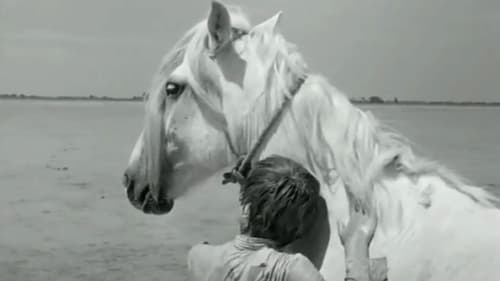
Albert Lamorisse
Nacimiento : 1922-01-13, Paris, France
Muerte : 1970-06-02
Historia
Albert Lamorisse (13 January 1922 – 2 June 1970) was a French filmmaker, film producer, and writer, who is best known for his award winning short films which he began making in the late 1940s, and also for inventing the famous strategic board game Risk in 1957. He was born in Paris, France.
He first came into prominence - just after Bim - for directing and producing White Mane (1953), an award winning short film that tells a fable of how a young boy befriends an untamable wild white stallion in the marshes of Camargue (the Petite Camargue).
His best known work is the short film The Red Balloon (1956), which earned him the Palme d'Or Grand Prize at the Cannes Film Festival, and an Oscar for writing the best original screenplay in 1956.
Lamorisse also wrote, directed and produced the well-regarded films Stowaway in the Sky (1960) and Circus Angel, as well as the documentaries Versailles and Paris Jamais Vu. In addition to films, he created the popular strategy board game Risk in 1957.
Lamorisse and his wife had three children: Pascal, a son, and two daughters named Sabine and Fanny. Pascal and Sabine were featured in The Red Balloon. Albert Lamorisse died in a helicopter crash while filming the documentary Le Vent des amoureux (The Lovers' Wind), during a helicopter-tour of Iran in 1970. His son and his widow completed the film, based on his production notes, and released the film eight years later, in 1978. It was nominated for a posthumous Oscar for best documentary.
Description above from the Wikipedia article Albert Lamorisse, licensed under CC-BY-SA, full list of contributors on Wikipedia.

Self (archival footage)
Pascal Lamorisse is the son of filmmaker Albert Lamorisse. He is also the little hero of some of his father's films (White Mane, The Red Balloon and Stowaway in the Sky). Over the years, Albert Lamorisse, who took his son on all his shoots, sought to transmit his expertise and his passion for filmmaking, even on his last film, The Lover's Wind. There is something in the story of Pascal Lamorisse that touches on a fabulous story: it is the story of the transmission of cinema from father to child.

Producer
A 1978 French documentary film directed by Albert Lamorisse about the landscape of Iran. Lamorisse was killed in a helicopter crash while filming the documentary, during a helicopter-tour of Iran. His widow completed the film, based on his production notes, and released the film eight years later in 1978.

Director
A 1978 French documentary film directed by Albert Lamorisse about the landscape of Iran. Lamorisse was killed in a helicopter crash while filming the documentary, during a helicopter-tour of Iran. His widow completed the film, based on his production notes, and released the film eight years later in 1978.

Cinematography
Short film about Paris by Albert Lamorisse.

Director
Short film about Paris by Albert Lamorisse.

Writer
Using a device to avoid vibration, Lamorisse employs a camera in a helicopter to capture the parks, gardens and Trianon building at Versailles.

Director
Using a device to avoid vibration, Lamorisse employs a camera in a helicopter to capture the parks, gardens and Trianon building at Versailles.

Writer
Philippe Avron plays a bumbling burglar whose crime career is a textbook case of failure. One evening, Avron comes upon an abandoned nightgown. Upon donning the garment, he feels he has been transformed into an angel. Avron then joins a strange circus, whence he hopes to dispense goodwill to the other misfits of the world. As with the other works of director Albert Lamorisse (The Red Balloon) Lamorisse, it is virtually impossible to determine where reality leaves off and fantasy takes over in Circus Angel, a fact that was instrumental in the film's winning a "Best Special Effects" award at the Cannes Film Festival.

Director
Philippe Avron plays a bumbling burglar whose crime career is a textbook case of failure. One evening, Avron comes upon an abandoned nightgown. Upon donning the garment, he feels he has been transformed into an angel. Avron then joins a strange circus, whence he hopes to dispense goodwill to the other misfits of the world. As with the other works of director Albert Lamorisse (The Red Balloon) Lamorisse, it is virtually impossible to determine where reality leaves off and fantasy takes over in Circus Angel, a fact that was instrumental in the film's winning a "Best Special Effects" award at the Cannes Film Festival.

Producer
A small child, fascinated by a lighter-than-air balloon, clambers aboard. The balloon takes flight, lifting the child upward to an amazing adventure. The land-bound adults have conniptions as the balloon wafts by; the child has nothing more than a great time.

Writer
A small child, fascinated by a lighter-than-air balloon, clambers aboard. The balloon takes flight, lifting the child upward to an amazing adventure. The land-bound adults have conniptions as the balloon wafts by; the child has nothing more than a great time.

Director
A small child, fascinated by a lighter-than-air balloon, clambers aboard. The balloon takes flight, lifting the child upward to an amazing adventure. The land-bound adults have conniptions as the balloon wafts by; the child has nothing more than a great time.

Producer
Un niño solitario encuentra un globo rojo... ¿o quizá es al revés? Y ambos, el niño y el globo mágico, vagan por las calles de París. Allí donde va el chico, el globo no anda detrás. Y cuando el pequeño se mete en problemas, el globo acude al rescate... Un poético mediometraje (protagonizado por el propio hijo del director; un crío de 4 años de edad), sin apenas diálogos, que fue inesperadamente galardonado con el Oscar al mejor guión original.

Writer
Un niño solitario encuentra un globo rojo... ¿o quizá es al revés? Y ambos, el niño y el globo mágico, vagan por las calles de París. Allí donde va el chico, el globo no anda detrás. Y cuando el pequeño se mete en problemas, el globo acude al rescate... Un poético mediometraje (protagonizado por el propio hijo del director; un crío de 4 años de edad), sin apenas diálogos, que fue inesperadamente galardonado con el Oscar al mejor guión original.

Director
Un niño solitario encuentra un globo rojo... ¿o quizá es al revés? Y ambos, el niño y el globo mágico, vagan por las calles de París. Allí donde va el chico, el globo no anda detrás. Y cuando el pequeño se mete en problemas, el globo acude al rescate... Un poético mediometraje (protagonizado por el propio hijo del director; un crío de 4 años de edad), sin apenas diálogos, que fue inesperadamente galardonado con el Oscar al mejor guión original.

Producer
Un muchacho llamado Folco encuentra por casualidad un caballo blanco salvaje en el Camargue, en el sur de Francia. Los rancheros intentan capturar el caballo, pero éste se escapa. El niño, sin embargo, intenta recuperarlo... Albert Lamorisse, que tres años depués realizaría el mediometraje de culto "El globo rojo" (Le ballon rouge, 1956), dirige esta aclamada historia sobre la infancia y la libertad premiada en Cannes con el Gran Premio del Jurado al mejor cortometraje.

Writer
Un muchacho llamado Folco encuentra por casualidad un caballo blanco salvaje en el Camargue, en el sur de Francia. Los rancheros intentan capturar el caballo, pero éste se escapa. El niño, sin embargo, intenta recuperarlo... Albert Lamorisse, que tres años depués realizaría el mediometraje de culto "El globo rojo" (Le ballon rouge, 1956), dirige esta aclamada historia sobre la infancia y la libertad premiada en Cannes con el Gran Premio del Jurado al mejor cortometraje.

Director
Un muchacho llamado Folco encuentra por casualidad un caballo blanco salvaje en el Camargue, en el sur de Francia. Los rancheros intentan capturar el caballo, pero éste se escapa. El niño, sin embargo, intenta recuperarlo... Albert Lamorisse, que tres años depués realizaría el mediometraje de culto "El globo rojo" (Le ballon rouge, 1956), dirige esta aclamada historia sobre la infancia y la libertad premiada en Cannes con el Gran Premio del Jurado al mejor cortometraje.

Screenplay
An Arab boy, Abdullah, loves his donkey, Bim, but another boy, Massoud, who also happens to be a prince, is jealous of Abdullah and his relationship with Bim, so Massoud steals the donkey and plays mean tricks on him, such as painting him and trying to cut his ears off. Abdullah tries to rescue Bim but is caught by palace guards and is imprisoned. Realizing Abdullah's love for his donkey, Massoud becomes ashamed of his meanness and frees Bim and Abdullah. However, the donkey eats Massoud's father's lunch and is taken to a butcher. Abdullah and Massoud try to rescue Bim from the butcher, but robbers get there first and steal the donkey along with the butcher's goods. The robbers escape to the sea, and Abdullah and Massoud stage one last rescue attempt with all of their friends to try to save Bim.

Director
An Arab boy, Abdullah, loves his donkey, Bim, but another boy, Massoud, who also happens to be a prince, is jealous of Abdullah and his relationship with Bim, so Massoud steals the donkey and plays mean tricks on him, such as painting him and trying to cut his ears off. Abdullah tries to rescue Bim but is caught by palace guards and is imprisoned. Realizing Abdullah's love for his donkey, Massoud becomes ashamed of his meanness and frees Bim and Abdullah. However, the donkey eats Massoud's father's lunch and is taken to a butcher. Abdullah and Massoud try to rescue Bim from the butcher, but robbers get there first and steal the donkey along with the butcher's goods. The robbers escape to the sea, and Abdullah and Massoud stage one last rescue attempt with all of their friends to try to save Bim.

Thanks




